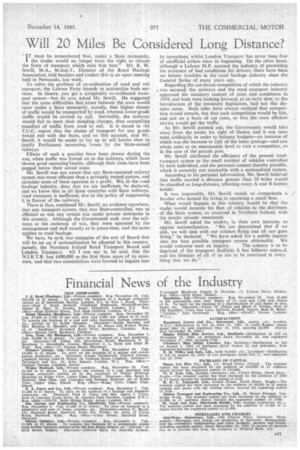Will 20 Miles Be Considered Long Distance?
Page 41

If you've noticed an error in this article please click here to report it so we can fix it.
' IT must be remembered that, under a State monopoly, I. the trader would no longer have the right to choose the form of transport which suits him best." Mr. R. W. Sewill, M.A., M.Inst.T., Director of the Road Haulage Association, told hauliers and traders this at an open meeting held in Newcastle, last week.
To solve the problem of co-ordination •of road and rail transport, the Labour Party intends to nationalize both services. In theory.. you get a completely co-ordinated transport system—but do you, asked Mr. Sewill. He suggested that the same difficulties that arose between the wars would recur under a State monopoly, namely, that higher classes of traffic would be transported by road, whereas lower-grade traffic would be carried oy rail. Inevitably, the railways would fail to meet their standing charges, thus compelling transfers of traffic from road to rail. It is stated in he T.U.C. report that the choice of transport for any goods would rest with the State, and on this account, said Mr. Sewill, it would be easier to lay up or sell lorries than to justify Parliament increasing losses by the State-owned railways
Effects of such a practice have been shown during the war., when traffic was forced on to the railways, which have shown good operatineresults, although their rates have been pegged below their actual costs.
M. Sewill was not aware that any State-operated railway system was more efficient than a privately owned system, and certainly none of them operates at a profit. We, in the toad haulage industry, deny that we are inefficient, he declared, and we know that in all those countries with State railways, road transport is inefficieni, due to the policy Of suppressing it in favour of the railways.
There-is thus, continued Mr. Sewill, no evidence anywhere, that arty transport system, that was State-controlled, was as efficient as was any system run under private enterprise in this country. Although the Government took over the railways at the outbreak of was, they were operated by the management and staff exactly as in peace-time, and the same applies to road haulage.
We have, he said, two examples of the sort of Board that will be set up if nationalization be adopted in this country. namely, the Northern Ireland Road Transport Board and London Transpoit. All I can say is, he said, that the N.1.R.T.B. lost £400,000 in the first three years of its existence, and that two commissions were formed to inquire into its operations, whilst London Transport has never been free of unofficial strikes since its beginning. On the other hand, although a Labour M.P. accused the industry of permitting the existence of bad conditions for drivers, there have been no labour troubles in the road haulage industry since the General Strike of many years ago.
Regarding the cut-throat competition of which the industry was accused, the railways and the road transport industry approved the statutory control of rates and conditions in 1939, and both were looking forward, at an early date, to the introduction of the necessary legislation, had not this disaster come. Both sides have always realized that competition would remain, but that such competition would be fair, and not on a basis of cut rates, so that he most efficient service would get the traffic.
As Mr. Sewill pointed out, the Government would take away from the trader his right of t hoice, and it can raise rates artificially in order to balance budgets—an instance of which was the increase to 20. of the letter postage—and can retain rates at an uneconomic level to ruin a competitor, as in the case of the parcels post.
Mt. Sewill attributed the efficiency of the present roadtransport system to the small number of vehicles controlled by each individual, and the personal contact thereby possible, which is certainly not attainable with a nationalized system.
According to his personal information, Mr. Sewill believed that traffic carried a distance greater than 20 tniles would be classified as long-distance, affecting every A and B licence holder.
It was impossible. Mr. Sewill stated, to compensate a haulier who earned his living in operating a small fleet. What would happen in this country would be that the trader would inmate his fleet of vehicles to the detriment of the State system, as occurred in Northern Ireland, with the results already mentioned.
Mr. Sewill asked the traders, in their own interests, to oppose nationalization. 'We are determined that if we sink, we will sink with our colo-nrs flying and all our guns firing," he declared. "We have asked for a public inquiry into the best possible transport system obtainable. We
would welcome such an inquiry. The conntry is to be deprived of the transport facilities it has hitherto enjoyi.d, and the liberties of all of us are to be restricted in every thine that we do."




























































